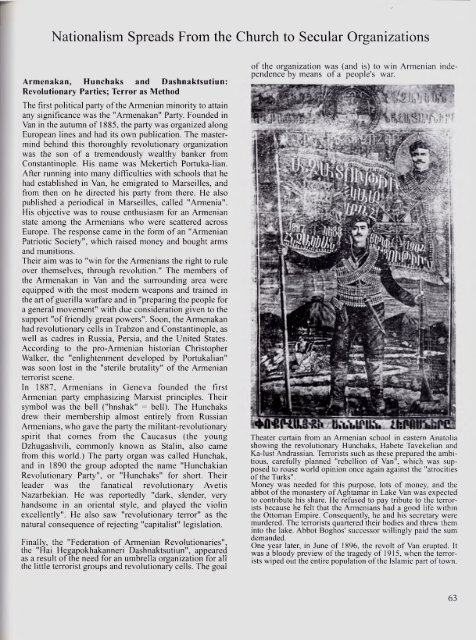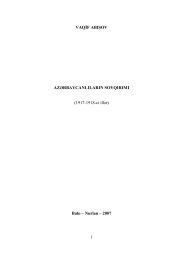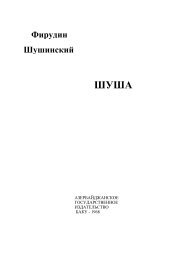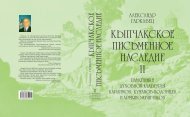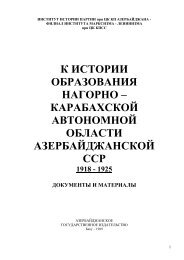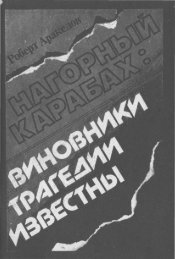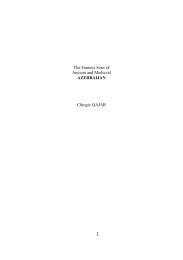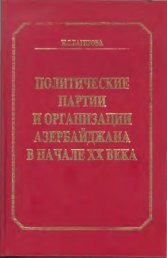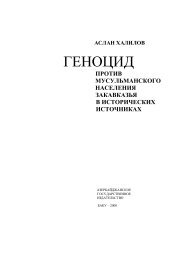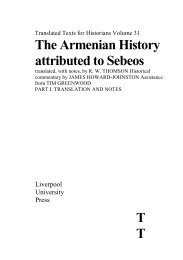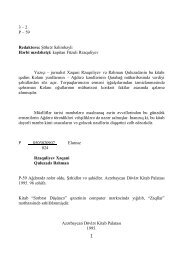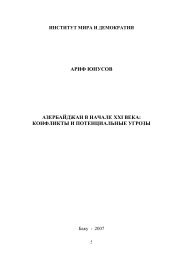ARMENIAN - Erevangala500
ARMENIAN - Erevangala500
ARMENIAN - Erevangala500
Create successful ePaper yourself
Turn your PDF publications into a flip-book with our unique Google optimized e-Paper software.
Nationalism Spreads From the Church to Secular Organizations<br />
A rm enakan, H unchaks and D ashnaktsutiun:<br />
Revolutionary Parties; T error as Method<br />
The first political party o f the Armenian minority to attain<br />
any significance was the "Armenakan" Party. Founded in<br />
Van in the autumn o f 1885, the party was organized along<br />
European lines and had its own publication. The mastermind<br />
behind this thoroughly revolutionary organization<br />
was the son o f a tremendously wealthy banker from<br />
Constantinople. His name was Mekertich Portuka-lian.<br />
After running into many difficulties with schools that he<br />
had established in Van, he emigrated to Marseilles, and<br />
from then on he directed his party from there. He also<br />
published a periodical in Marseilles, called "Armenia".<br />
His objective was to rouse enthusiasm for an Armenian<br />
state among the Armenians who were scattered across<br />
Europe. The response came in the form o f an "Armenian<br />
Patriotic Society", which raised money and bought arms<br />
and munitions.<br />
Their aim was to "win for the Armenians the right to rule<br />
over themselves, through revolution." The members o f<br />
the Armenakan in Van and the surrounding area were<br />
equipped with the most modem weapons and trained in<br />
the art o f guerilla warfare and in "preparing the people for<br />
a general movement" with due consideration given to the<br />
support "o f friendly great powers". Soon, the Armenakan<br />
had revolutionary cells in Trabzon and Constantinople, as<br />
well as cadres in Russia, Persia, and the United States.<br />
According to the pro-Armenian historian Christopher<br />
Walker, the "enlightenment developed by Portukalian"<br />
was soon lost in the "sterile brutality" o f the Armenian<br />
terrorist scene.<br />
In 1887, Armenians in Geneva founded the first<br />
Armenian party emphasizing Marxist principles. Their<br />
symbol was the bell ("hnshak" = bell). The Hunchaks<br />
drew their membership almost entirely from Russian<br />
Armenians, who gave the party the militant-revolutionary<br />
spirit that com es from the Caucasus (the young<br />
Dzhugashvili, commonly known as Stalin, also came<br />
from this world.) The party organ was called Hunchak,<br />
and in 1890 the group adopted the name "Hunchakian<br />
Revolutionary Party", or "Hunchaks" for short. Their<br />
leader was the fanatical revolutionary Avetis<br />
Nazarbekian. He was reportedly "dark, slender, very<br />
handsome in an oriental style, and played the violin<br />
excellently". He also saw "revolutionary terror" as the<br />
natural consequence o f rejecting "capitalist" legislation.<br />
Finally, the "Federation o f Armenian Revolutionaries",<br />
the "Hai Hegapokhakanneri Dashnaktsutiun", appeared<br />
as a result o f the need for an umbrella organization for all<br />
the little terrorist groups and revolutionary cells. The goal<br />
o f the organization was (and is) to win Armenian independence<br />
by means o f a people's war.<br />
Theater curtain from an Armenian school in eastern Anatolia<br />
showing the revolutionary Hunchaks, Habete Tavekelian and<br />
К а-lust Andrassian. Terrorists such as these prepared the ambitious,<br />
carefully planned "rebellion o f Van", which was supposed<br />
to rouse world opinion once again against the "atrocities<br />
o f the Turks".<br />
Money was needed for this purpose, lots o f money, and the<br />
abbot o f the monastery o f Aghtamar in Lake Van was expected<br />
to contribute his share. He refused to pay tribute to the terrorists<br />
because he felt that the Armenians had a good life within<br />
the Ottoman Empire. Consequently, he and his secretary were<br />
murdered. The terrorists quartered their bodies and threw them<br />
into the lake. Abbot Boghos' successor willingly paid the sum<br />
demanded.<br />
One year later, in June o f 1896, the revolt o f Van erupted. It<br />
was a bloody preview o f the tragedy o f 1915, when the terrorists<br />
wiped out the entire population o f the Islam ic part o f town.<br />
63


